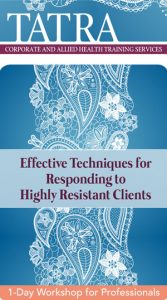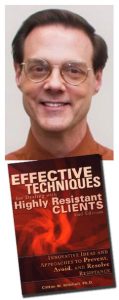10 Jun Effective Techniques for Responding to Highly Resistant Clients
Course Content

This is a fast paced, highly practical training designed to teach innovative approaches and ideas to achieve successful outcomes with clients who:
- Are challenging
- Court-referred
- Unmotivated
- Give you “Yes, but…” or “I don’t know” responses
- Are involuntary
- Who blame others
- Who resist taking responsibility for creating change
- Change their focus
Such clients provide a unique challenge to professionals attempting to provide quality services to both the client and referral source. You will learn what to do in order to prevent, avoid, and resolve what has traditionally been deemed ‘resistance’. Numerous techniques that are applicable across a wide array of clients and problems will be presented, discussed, and illustrated through video demonstrations.
Emphasis will be on ‘how to’ aspects of maximising the potential for client movement towards goals and positive life changes. Techniques presented can be integrated with all theoretical approaches Specifically, difficulties in managing challenging clients will be approached as a phenomenon of the dialogue and interaction between the practitioner and the client. Techniques will be offered to create impactful client-practitioner dialogue through the meticulous use of language and other skills in the moment-to-moment interactions. Those trained in traditional Motivational Interviewing will find the techniques offered will take their skills to the next level and circumvent inherent weaknesses in the approach.
Upon completion of this training, participants will have a broad array of techniques to add to their repertoire to improve client outcomes and to aid in reducing the stress and burnout that accompanies their most frustrating clientworker interactions. Included in this training will be new, cutting-edge research on the use of priming in the therapeutic dialogue. Priming statements join with clients’ current psychological state and readies them for new perspectives and behaviours. The research on the impact of priming is exceptionally compelling yet, this powerful linguistic tool is rarely discussed with regards to its clinical implications.
Ultimately, attendees will learn what priming is, the theory behind what occurs in the brain when priming occurs, and how to incorporate priming into the dialogue with the client for improved outcomes.


- Conceptualise what has historically been deemed ‘resistance’ in a manner that empowers workers to avoid, circumvent, and utilise it for client benefit.
- Describe and understand the most common errors workers make that hinder client movement.
- Understand and explain the inherent power of the therapeutic impact of language and employ numerous specific linguistic techniques that dissolve barriers with mandated clients.
- Understand methods for dealing with common difficulties such as “Yes, but…” and “I don’t know” responses.
- Explain the putfalls of over-questioning and how to employ more effective alternative approaches.
- Define what priming is and describe how and why it has such a significant impact on mental processing and incorporate priming principles into the therapeutic dialogue.


Clifton Mitchell Ph.D., is an international clinical trainer and keynote speaker who has a love for teaching and over 23 years of training experience. He delivers practical information in a uniquely entertaining, fast-paced style that is filled with humor and examples from his experience in mental health. For over 15 years, he has studied and presented seminars on methods for dealing with resistance in therapy.
In his book, Effective Techniques for Dealing with Highly Resistant Clients, he presents cutting-edge approaches for managing psychological resistance. He has trained thousands of mental health professionals in the management of difficult, perplexing legal and ethical issues and his latest training is in an exciting, dynamic game show format.
He has also been the keynote speaker at conventions and taught hundreds of mental health organizations, businesses, leadership groups, and civic organizations effective techniques for improving communications and for creating change through the precise use of language.
He is a contributing author in therapy books and published in numerous professional journalsincluding the Psychotherapy Networker, Psychotherapy in Australia, Journal of Personality Assessment, Perceptual and Motor Skills, Psychologists’ Desk Reference, Case In Point: Advanced Care Coordination, Favorite Counseling and Therapy Techniques, Psychology and Education, Journal of Psychological Type, The Professional School Counselor, Vistas, and The Advocate.
His research includes investigations of therapeutic resistance, legal and ethical issues, subliminal message tapes, stress and coping, and personality types. Dr. Mitchell is currently a professor of counseling at East Tennessee State University in Johnson City, Tennessee, where he received the Teacher of the Year award in 2002.
David has a Master’s degree in Health Care Bioethics from Loyola Marymount University, USA, and he did his undergraduate degree at University of Southern California. He is a member of the American College of Health Care Executives. He is a certified AMA / EPEC (Education for Physicians) trainer. He also is the founding chairperson for the Hospital Association of Southern California Palliative Care Committee and spent the last decade as an executive in a 650 bed, three hospital system in Los Angeles County.

This online workshop will give you instant access to 6 hours of video content, accessible via streaming on our website, as well as downloads for supplemental materials. You can view the course content in your own time, there is no time limit on access.
Please click the green ‘Mark Complete’ button on each module as you progress.
A certificate of completion will be generated upon finishing the course and completing a short assessment quiz. If the certificate is not showing, please confirm you have marked all sections as ‘Complete’. Please consult your professional organisation/association to confirm whether you are able to claim any CPD points/hours for this online workshop.



